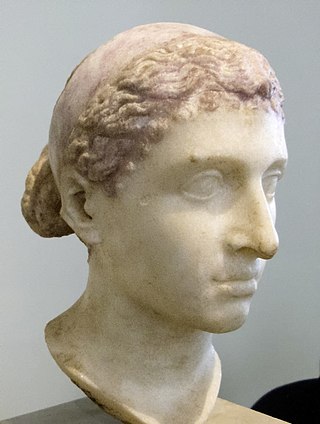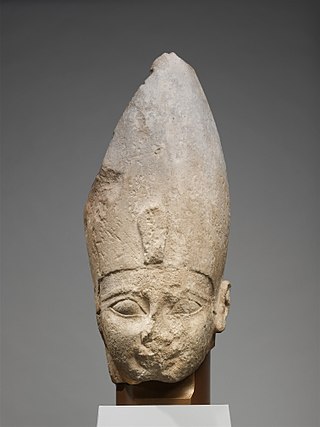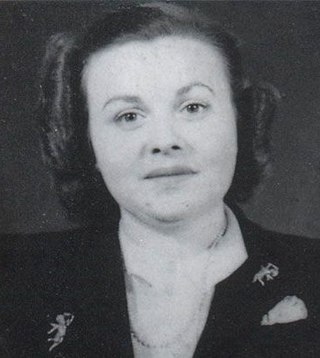
Anubis, also known as Inpu, Inpw, Jnpw, or Anpu in Ancient Egyptian, is the god of funerary rites, protector of graves, and guide to the underworld, in ancient Egyptian religion, usually depicted as a canine or a man with a canine head.

Cleopatra VII Thea Philopator was Queen of the Ptolemaic Kingdom of Egypt from 51 to 30 BC, and its last active ruler. A member of the Ptolemaic dynasty, she was a descendant of its founder Ptolemy I Soter, a Macedonian Greek general and companion of Alexander the Great. Her first language was Koine Greek, and she is the only Ptolemaic ruler known to have learned the Egyptian language. After her death, Egypt became a province of the Roman Empire, marking the end of the last Hellenistic-period state in the Mediterranean, a period which had lasted since the reign of Alexander.

Thebes, known to the ancient Egyptians as Waset, was an ancient Egyptian city located along the Nile about 800 kilometers (500 mi) south of the Mediterranean. Its ruins lie within the modern Egyptian city of Luxor. Thebes was the main city of the fourth Upper Egyptian nome and was the capital of Egypt for long periods during the Middle Kingdom and New Kingdom eras. It was close to Nubia and the Eastern Desert, with its valuable mineral resources and trade routes. It was a religious center and the most venerated city during many periods of ancient Egyptian history. The site of Thebes includes areas on both the eastern bank of the Nile, where the temples of Karnak and Luxor stand and where the city was situated; and the western bank, where a necropolis of large private and royal cemeteries and funerary complexes can be found. In 1979, the ruins of ancient Thebes were classified by UNESCO as a World Heritage Site.

Ahmose I was a pharaoh and founder of the Eighteenth Dynasty of Egypt in the New Kingdom of Egypt, the era in which ancient Egypt achieved the peak of its power. His reign is usually dated to the mid-16th century BC at the beginning of the Late Bronze Age.

Madeleine Zoe Damerment was a French agent of the United Kingdom's clandestine Special Operations Executive (SOE) organization during World War II. The purpose of SOE was to conduct espionage, sabotage, and reconnaissance in countries occupied by the Axis powers, especially Nazi Germany. SOE agents allied themselves with resistance groups and supplied them with weapons and equipment parachuted in from England. Damerment was first involved in escape lines helping downed allied airmen escape occupied France. She fled France in March 1942 to avoid arrest. After arriving in Britain, she was recruited by the SOE. Damerment was to be a courier for SOE's Bricklayer circuit but was captured by the Gestapo on 29 February 1944 upon arrival in France. The Gestapo knew she was coming because they had captured SOE radios and were reading SOE radio messages. She was subsequently executed at the Dachau concentration camp on 13 September 1944 along with three other female SOE agents.
The history of ancient Egypt spans the period from the early prehistoric settlements of the northern Nile valley to the Roman conquest of Egypt in 30 BC. The pharaonic period, the period in which Egypt was ruled by a pharaoh, is dated from the 32nd century BC, when Upper and Lower Egypt were unified, until the country fell under Macedonian rule in 332 BC.

Avaris was the Hyksos capital of Egypt located at the modern site of Tell el-Dab'a in the northeastern region of the Nile Delta. As the main course of the Nile migrated eastward, its position at the hub of Egypt's delta emporia made it a major capital suitable for trade. It was occupied from about the 18th century BC until its capture by Ahmose I.

The Seventeenth Dynasty of Egypt was a dynasty of pharaohs that ruled in Upper Egypt during the late Second Intermediate Period, approximately from 1580 to 1550 BC. Its mainly Theban rulers are contemporary with the Hyksos of the Fifteenth Dynasty and succeed the Sixteenth Dynasty, which was also based in Thebes.

Some Answered Questions is a compilation of table talks of ʻAbdu'l-Bahá that were collected by Laura Clifford Barney between 1904 and 1906 across several pilgrimages. The book was first published in English in 1908. ʻAbdu'l-Bahá was the son of Baháʼu'lláh, the founder of the Baháʼí Faith, and was appointed by him as his successor and interpreter of his words.
Merkland Street station was one of the original 15 stations on the Glasgow Subway. It is the only ghost station on the system. The station opened in 1896. It was located 25 metres (27 yd) to the south-west of its replacement, Partick station and about 300 metres (330 yd) to the south of Partickhill railway station. It closed permanently in 1977 when the rest of the network was closed for modernisation. The modernisation had been announced in 1974 by the subway's then operators, the Greater Glasgow Passenger Transport Executive (GGPTE). Although converted to electric traction in 1935, the system's infrastructure and rolling stock was virtually unchanged from its opening in 1896, and improvement to the subway was seen by the GGPTE as an essential part of plans to eliminate transport bottlenecks in the city. As part of the process, which began in 1977, all 15 stations were to be rebuilt. However it was planned to link the subway to the national rail network's newly reopened Argyle Line at Partick via an interchange station. This meant permanently closing Merkland Street and opening a new station a short distance away.
Sakir-Har was a Hyksos king of the early Fifteenth Dynasty of Egypt, ruling over some part of Lower Egypt during the Second Intermediate Period, possibly in the early 16th century BC.
Jacqueline Nearne MBE, code named Jacqueline and Josette, was an agent for the British Special Operations Executive (SOE) in Nazi-occupied France during World War II. The purpose of SOE was to conduct espionage, sabotage, and reconnaissance in countries occupied by Nazi Germany and other Axis powers. SOE agents in France allied themselves with resistance groups and supplied them with weapons and equipment parachuted in from England. Nearne was a courier with the Stationer network operating mostly in the Clermont-Ferrand area. She worked in France for the unusually long time of 14 months and returned safely to England.

Joe Palmer was a football manager, who was the first to manage both Bristol City and Bristol Rovers.

Dead Man's Walk is a footpath running east–west in central Oxford, England, situated immediately to the south of Merton College and just outside the old city wall, with Corpus Christi College at the western end. To the north, Grove Walk connects with Merton Street through a gateway. Immediately to the south is Merton Field with Merton Walk connecting to the wide tree-lined Broad Walk, which runs parallel with Dead Man's Walk. Beyond that is Christ Church Meadow.

Akhet is an Egyptian hieroglyph that represents the sun rising over a mountain. It is translated as "horizon" or "the place in the sky where the sun rises". Betrò describes it as "Mountain with the Rising Sun" and an ideogram for "horizon".
A bibliography of books related to the Vale of Glamorgan, south Wales.
Francis Windebank supported the Royalist cause during the English Civil War. He was court-martialed and shot for failing to defend Bletchingdon Park, near Oxford.
George Davison was a professional footballer, who played in the Southern League for Coventry City and Bristol Rovers.
George Richards was a professional association footballer who played in the Southern League for Bristol Rovers prior to the First World War.
The Exodus is the founding myth of the Israelites. The scholarly consensus is that the Exodus, as described in the Torah, is not historical, even though there may be a historical core behind the Biblical narrative.










